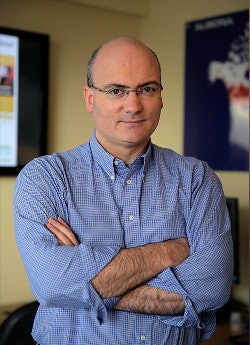 Mike Feerick, ALISON founder
Mike Feerick, ALISON founderCould education be the path to helping former prison inmates reintegrate successfully into society? Many politicians are saying yes, and one social entrepreneur has created an online program designed to help prisoners prepare for the job market.
Mike Feerick, an Irish social entrepreneur, is the founder of ALISON (Advance Learning Interactive Systems Online), a system of online courses that started up in 2007 and have since spread across the globe. ALISON launched a series of training courses for American inmates in early July, with an eye to help former inmates build better lives for themselves and avoid ending up back in prison.
Despite being the home of the free, as the national anthem would have it, a high percentage of the population is behind bars in the United States. A commonly cited statistic shows that, although America has less than 5 percent of the world’s population, it has an astonishing 25 percent of the world’s prison population. That means the percentage of persons in prison in the U.S. is the second highest in the world, surpassing countries such as Russia, Cuba and China. It is exceeded only by the Seychelles, a tiny nation of islands in the Indian Ocean, home to 90,000 souls.
In real numbers, there are about 2.2 million prisoners in the United States, with a disproportionately high number of African-American and Latinos locked up. Blacks are six times as likely to be in prison as Whites; and Latinos, twice as likely. The annual tab to keep them all imprisoned is $80 billion, close to the Department of Education’s budget.
Criminal justice reform would seem to be a necessity, and it has garnered support from leaders of all political persuasions. Criminal justice reform now has the overt backing of President Barack Obama, who made his stance on the matter clear last week. He has now commuted a total of 89 sentences of federal inmates convicted of non-violent drug crimes as of last Monday. He is the first sitting president to visit a federal prison, stopping by the El Reno prison in Oklahoma last Thursday.
Obama also laid out his vision for reform at the NAACP convention in Philadelphia on Tuesday. Obama’s priorities are easing mandatory minimum sentencing, overhauling solitary confinement practices, re-enfranchising felons, and providing job training for prisoners.
“While people in our prisons have made some mistakes, and sometimes big mistakes, they are also Americans and we have to make sure that, as they do their time, we are increasing the possibility that they can turn their lives around,” Obama said on Tuesday. “Justice and redemption go hand in hand.”
One issue of the American correctional system is not just that so many are locked up. Each year, approximately 600,000 people are released from federal and state prison. But they often find themselves back in jail. A memo from the White House sent out on Tuesday attributes high recidivism rates to the stain that a criminal history leaves on felons’ records, even after they have paid back their debt to society. Their criminal records may prevent them from finding a job, obtaining housing or loans, or going to school.
Unable to move forward with their lives in a constructive fashion, many fall back into criminal behavior. A 2014 Department of Justice study of recidivism rates tracked more than 400,000 prisoners after their releases in 2005. It found that nearly 68 percent were re-arrested within three years. A further 77 percent were re-arrested within five years.
The courses for former inmates that ALISON developed show that there are affordable options for educating the prison population. ALISON’s courses, which were designed with input from members of the U.S. Correctional Services, aim to curb the high rate of recidivism by helping inmates hone the skills relevant to the jobs they are most likely to find straight out of prison.
In an interview with Diverse, Feerick said that ALISON’s coursework is ideally suited for populations like former prison inmates because it is more affordable than the traditional brick and mortar school and it is so versatile. Anyone can take the course, provided they have internet access and a computer, tablet, or smartphone.
“With free learning, there is a new opportunity for re-entry [into society] for these people because what they can learn online is becoming much more unlimited,” Feerick said.
The courses, which are free, focus on basic study skills training, IT skills, and soft skills relevant to customer service. Each course takes between 20 and 30 hours to complete.
As Feerick imagines it, courses such as ALISON’s could eventually be used in place of or in tandem with the mandatory 200 hours of community service required of released prisoners. Parole officers would be able to ensure that former inmates had completed their coursework by having them take corresponding tests.
“To date, judges have not been able to prescribe mandatory education because of the cost,” Feerick said. “Now a parole officer can monitor and test a formerly incarcerated person without huge college-type expense.”
The courses launched recently, so time will tell on whether the program gains traction among the large numbers of formerly incarcerated individuals within the U.S. So far, Feerick said, ALISON is in advanced discussion regarding potential partnerships with several large prison systems within the United States.
Feerick is an advocate of better education and training for prisoners with an eye to improving their prospects once they are released. “If you spent 10 or 5 percent of the cost of incarceration on educating these people and giving them a better chance in life, wouldn’t that be a smart thing to do?” he asks.
Staff writer Catherine Morris can be reached at [email protected].















